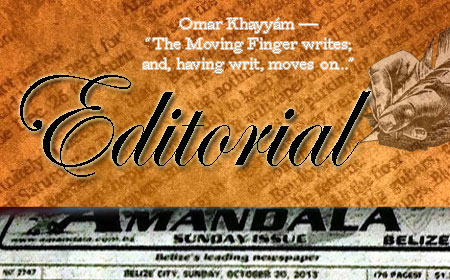To our mind, the most significant development over the weekend was the fact that the leaders of Belize’s teachers gave up their Tenth of September holiday on Saturday to come to Belize City for a national Council of Management meeting. This followed “emergency” branch meetings of teachers on Thursday afternoon, September 8, when they left their classrooms to discuss the Government of Belize’s request for the teachers’ financial benefits to be deferred until next year.
The “emergency” meetings on Thursday afternoon resulted that evening in a castigation of the Belize National Teachers Union (BNTU) on national radio and television by the Chief Education Officer, Dr. Carol Babb. BNTU President, Luke Palacio, replied in kind, as we would say.
We don’t think we would be exaggerating if we said that the economy of Belize is in a serious tailspin and that Belize’s public finances are in a mess. Belize’s teachers may be the best informed and most well-read section of our population. They have to be in classrooms every day where they must be on their toes intellectually to keep pace with their students. What appears to be impatience and disaffection on the teachers’ part, where their money is concerned, is not presently the case with their counterparts in the Public Service Union (PSU).
When party politics began in Belize in 1950, the public officers were considered not only the intellectual elite but also the militant vanguard of the trade union movement here. On a whole the public officers had pro-British sympathies, whereas the non-clerical trade unions of Belize, originally led by the General Workers Union (GWU), were solidly in support of the anti-colonial People’s United Party (PUP), which won all general elections in British Honduras/Belize from 1959 to 1979, the PUP’s general election victory of 1979 being the springboard to Independence in 1981.
Established in 1970, the BNTU for many years was not a notable force in Belize’s public affairs, primarily, we suppose, because the teachers were controlled by the Christian churches which owned and operated most of the schools in Belize. Remember, in many cases the teachers were devout members of the church congregations in whose schools they taught. Under the leadership of people like the late John Pinelo and retired George Frazer, however, the BNTU became a national force here during the 1990s, and following the Social Security Board (SSB) and Development Finance Corporation (DFC) scandals of 2004, the teachers, we suggest, became bigger than the churches in whose schools they taught.
The greed and corruption of Belize’s elected politicians became an issue after 1998, and we would venture to say that it is the teachers, as organized in the BNTU, of whom thieving politicians have become most afraid. Belize is somewhat of an anomaly in our region in that students are of no account politically: it is Belize’s teachers who are a force in public affairs.
The nature of the teaching profession is such that young men and women who are fascinated by material possessions and want to become wealthy, do not join the teaching profession’s ranks. Belize’s teachers are special citizens. Our teachers are the salt of the Belizean earth. It should be of great concern to the ruling United Democratic Party (UDP) that the teachers are taking a hard line where their financial benefits are concerned. Prime Minister, Rt. Hon. Dean O. Barrow, if no one else in Cabinet, is aware that the incipient intransigence of the BNTU really represents an implicit condemnation of his Ministers’ and political cronies’ greed and corruption. If the teachers of Belize reach the point where they feel they are being taken for fools by the present administration, Belize will become even more unstable.
Constitutionally, Belize’s political system, it is now fairly well established, is a monarchical one. Prime Ministers are elected to be kings for five-year terms. Once the Prime Minister arranges it so that his executive Cabinet cannot be challenged and upset in the House by the legislature, then there is no possibility of a House vote of no confidence on any issue, no matter how angry the masses of the Belizean people become. Because all our Prime Ministers have indeed made it so that Cabinet Ministers comprise a voting majority of the House, Belize Prime Ministers rule by Cabinet: ours is not a parliamentary democracy. Long live the king.
Consider the year 2005. If ever the masses of the Belizean people were angry, it was then. The People’s United Party (PUP) government of Prime Minister Said Musa, however, survived until its five-year term came to an end in February of 2008. It was not possible to bring down the Musa government in the House, and the Belizean people do not have a tradition of bloody political violence in the streets. The result was that Belize spent three years fiddling and diddling between 2005 and 2008.
The teachers have the ability to create major discomfort for this UDP administration. If the teachers ever reach the point of taking industrial action, history has shown that Belize’s parents will side with the teachers instead of with the ruling politicians. The parents themselves will become angry with the government, because children out of school and confined to home harass their parents’ nerves.
It appears to us that the position of the teachers would be simple, straightforward and as follows: how can we be asked to make a financial sacrifice when all your Ministers and cronies are eating, drinking, and being merry? We concur.
Power to the people! Remember Danny.

